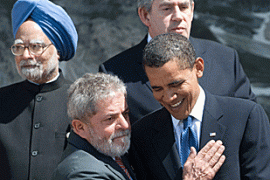G8 leaders to make Africa pledge
Western powers expected to announce $15bn to promote food security for world’s poor.

The development programme seeks to enable poor farmers to produce more of their own food by improving productivity, and shifts the focus from delivering aid.
Food security
According to the United Nations, the number of malnourished people now exceeds one billion.
Stephen Chan, professor of African studies at the School of Oriental and African Studies in London, told Al Jazeera that it was important for poor countries to have self sufficiency.
“Getting food security … particularly in a productive way so that people become self-sufficient by way of growing food themselves, I think that’s extremely important,” he said.
| In depth |
|
|
“The whole question of very cheap food exports, food dumping as it were from Western countries … can be a very real problem because that provides a disincentive for local farmers to be able to provide their own agricultural products.
Chan said open markets become meaningful “when there’s competition that goes both ways, when African states for instance are also able to compete against Western producers. And we’re a long way from that right now”.
Charity workers previously expressed disappointment at what they see as broken promises from leaders, after Italy announced a 56 per cent cut in its aid budget this year.
Al Jazeera’s Alan Fisher, reporting from L’Aquila, said Friday’s meeting “really does need a success on the final day if people are to say this G8 has achieved something concrete”.
Leaders of Algeria, Angola, Egypt, Ethiopia, Libya, Nigeria, Senegal and South Africa will discuss food security and farming, and to push their demand for compensation for the ravages of climate change.
Climate change
The leaders of the world’s most polluting nations vowed on Thursday to step up their battle against climate change.
But the agreed measures were damned as insufficient by the UN and environmental groups.
Heads of state and government from 16 countries have for the first time endorsed the scientific view that a rise in average temperatures of more than 2C will have catastrophic consequences for the planet.
The consensus was reached on Thursday by Britain, Canada, France, Germany, Italy, Japan, Russia, the US, Brazil, China, India, Mexico, South Africa, Australia, Indonesia and South Korea in a meeting held on the sidelines of a Group of Eight summit in the city of L’Aquila.
These countries together account for three-quarters of world emissions.
‘Special responsibility’
The deal, however, was described by Ban Ki-moon, the UN secretary-general, as “not sufficient”.
He said in a statement that the deal should be backed by medium-term measures to prevent the catastrophic impact of climate change.
“The countries represented at L’Aquila are responsible for more than 80 per cent of global emissions, and that is why they bear special responsibility for finding a solution to the political impasse,” Ban said.
“If they fail to act this year, they will have squandered a unique historical opportunity that may not come again.”
The only leader not present at the summit was Hu Jintao, the Chinese president. He had been set to attend, but flew home to confront ethnic riots in Xinjiang.
